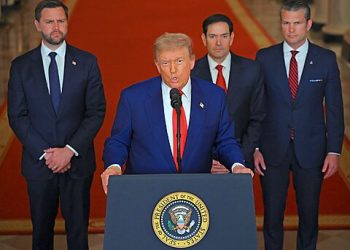As President Donald Trump threatens so-called “reciprocal tariffs” on US trading partners, some countries are offering lower duties to avoid the US leader’s wrath. Vietnam recently announced that it is cutting tariffs on a range of US exports, including energy and agricultural products, as well as approving the Starlink satellite internet system owned by Trump ally Elon Musk. Similarly, India appears willing to cut its tariffs on approximately half of all US imports, and Israel is removing all remaining tariffs on US goods (although the move’s practical import is less dramatic, as the vast majority of US exports were already duty-free thanks to a 1985 trade deal).
More countries may follow.
At least on the surface, such developments seem to vindicate Trump’s aggressive approach. Merely the risk of higher tariffs has prompted countries to offer lower duties, with attendant benefits for US exporters. It’s not difficult to see why some might claim this as an example of the president’s much-ballyhooed dealmaking prowess in action.
But let’s not put this in the win column just yet.
Although tariff cuts on US exports are always welcome, they must be balanced against the totality of Trump’s record. That looks set to include not only tariff reductions by the likes of India (which received $41.8 billion in US exports in 2024) and Vietnam ($13.1 billion), but also retaliatory tariff increases by key trading partners such as Canada (a $349.4 billion export market in 2024) and the European Union ($370.2 billion).
That the benefits of lowered tariffs from some countries will outweigh the burden of looming retaliatory tariffs on US exporters is not clear.
Additionally, whatever tariff cuts US trading partners announce in response to Trump’s pressure could prove fleeting. The unilateral reductions announced by India and Vietnam, for example, are not secured by binding agreements. Absent such a deal, there is nothing to prevent these countries from raising their tariffs in the future.
Lastly, whatever tariffs Trump imposes as part of his reciprocal tariff policy will harm the US economy as businesses and consumers contend with higher prices. Just as trade is mutually beneficial, barriers to trade, such as tariffs, create losses on both sides of the exchange.
Between retaliation and the burden of higher tariffs, the pain caused by Trump’s approach will almost surely outweigh any (potentially short-lived) gains.
Furthermore, there’s also a significant opportunity cost here. If Trump is interested in securing a reciprocal lowering of tariffs, there’s a far better way of doing it.
Rather than rattling his tariff saber, Trump should pursue new free trade agreements (FTAs). Through such deals, the US and its trading partners can lower (ideally, eliminate) tariffs, remove non-tariff barriers (e.g., “Buy America” rules and the Jones Act), and agree upon a common set of rules for conducting trade and more deeply integrating their economies. Such agreements—which the United States has negotiated with 20 countries—offer far greater tariff reductions than whatever the likes of India, Vietnam, or anyone else are likely to offer.
This isn’t theoretical. Under the Trans-Pacific Partnership FTA signed by the United States in 2016, Vietnam was slated to permanently reduce or eliminate the vast majority of its tariffs on US exports. Trump, however, withdrew from the deal shortly after taking office in 2017, and now the US must content itself with Vietnam cutting tariffs on a more modest range of products.
All of this assumes, of course, that President Trump is truly interested in a mutual lowering of tariffs and not merely searching for new justifications to raise US duties. Unfortunately, that seems an increasingly dubious proposition.
















